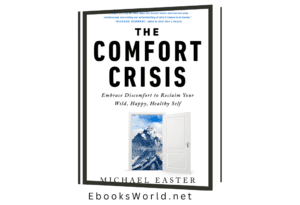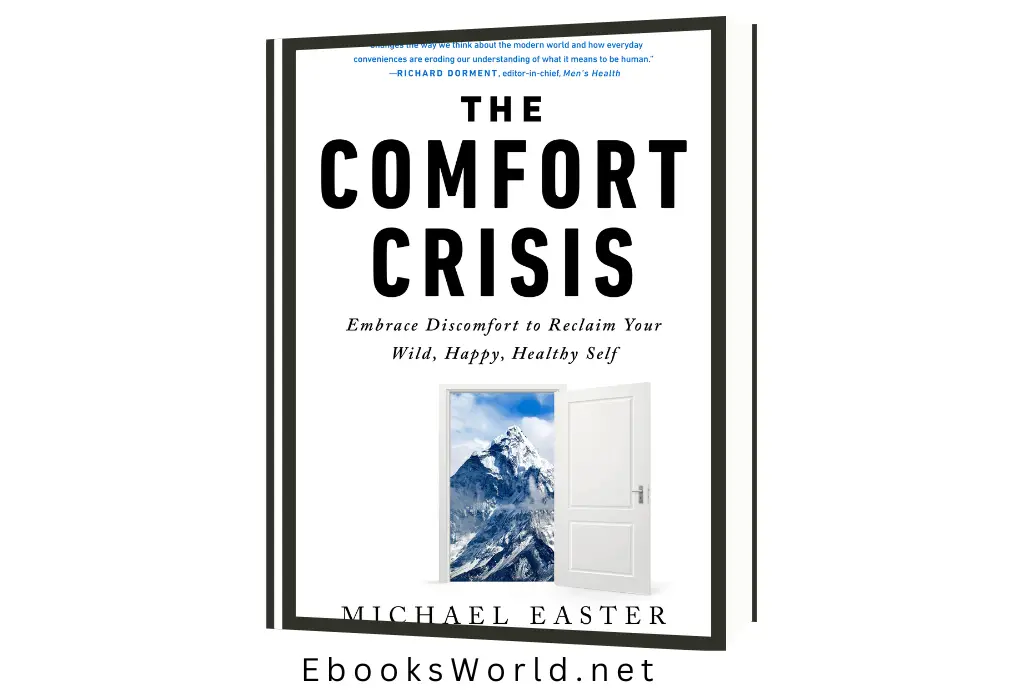The Comfort Crisis: Embrace Discomfort To Reclaim Your Wild, Happy, Healthy Self

Ratings
“The Comfort Crisis: Embrace Discomfort to Reclaim Your Wild, Happy, Healthy Self” is a book by Michael Easter that challenges the modern societal obsession with comfort and convenience. Easter argues that our relentless pursuit of comfort has led to a decline in our physical and mental well-being, and he advocates for embracing discomfort as a means to reclaim a more resilient, fulfilling life. Here’s a summary of the key concepts in the book:
1. The Comfort Conundrum
Easter begins by exploring the paradox of modern comfort. Despite having more convenience and comfort than ever before, rates of chronic diseases, mental health issues, and general dissatisfaction have risen. He suggests that our aversion to discomfort has contributed to a decline in our overall health and happiness.
2. The Evolutionary Perspective
Easter delves into the evolutionary roots of humanity, highlighting how our ancestors lived in harsh and unpredictable environments. He argues that our bodies and minds are adapted for a life of challenge and struggle, and our sedentary, overly comfortable lifestyles are at odds with our evolutionary heritage.
3. The Physiology of Discomfort
The book explores the physiological benefits of embracing discomfort. Easter explains how exposure to stressors, such as cold, heat, and physical exertion, triggers adaptive responses in the body. This includes the activation of stress hormones, improved immune function, and the release of neurotransmitters that enhance mood and resilience.
4. The Mental and Emotional Benefits
Easter discusses the psychological advantages of discomfort, including increased mental toughness, enhanced problem-solving skills, and a greater sense of accomplishment. He argues that facing challenges head-on can lead to personal growth and improved overall well-being.
5. The Comfort Paradox
The author introduces the concept of the “comfort paradox,” emphasizing that our pursuit of comfort often results in discomfort in the long run. For example, avoiding physical activity may lead to health issues, and avoiding difficult conversations may strain relationships. Easter encourages readers to reconsider their aversion to discomfort and recognize its role in personal development.
6. Nature Connection
Easter explores the therapeutic benefits of spending time in nature and engaging in activities that bring us closer to the natural world. He argues that our disconnection from nature contributes to stress and mental health issues, and he advocates for incorporating outdoor experiences into our lives to promote well-being.
7. The Role of Technology
The book examines the impact of technology on our comfort-driven lifestyles. While acknowledging the benefits of technological advancements, Easter also highlights the negative consequences, such as sedentary behavior, screen addiction, and the erosion of face-to-face social connections. He encourages a mindful and balanced approach to technology use.
8. Embracing Discomfort in Daily Life
Easter provides practical tips for incorporating discomfort into everyday life. This includes adopting cold exposure through cold showers or outdoor activities, engaging in intermittent fasting, and incorporating physical challenges into exercise routines. By intentionally introducing discomfort, individuals can build resilience and improve their overall health.
9. The Importance of Community
The author stresses the role of social connections in navigating discomfort. He argues that facing challenges is often easier when done within a supportive community. Whether it’s a workout group, a sports team, or a group of friends, shared experiences of discomfort can strengthen social bonds and contribute to individual well-being.
10. Rethinking Success and Happiness
Easter challenges conventional notions of success and happiness, suggesting that true fulfillment comes from a life rich in experiences, challenges, and personal growth. He encourages readers to redefine their goals and priorities, focusing on meaningful connections, personal development, and a balanced approach to comfort.
In conclusion, “The Comfort Crisis” by Michael Easter presents a compelling argument for embracing discomfort as a path to reclaiming a more resilient, happy, and healthy life. By understanding the physiological and psychological benefits of discomfort and making intentional choices to incorporate challenges into daily life, individuals can break free from the comfort paradox and reconnect with their primal, adaptable selves.







